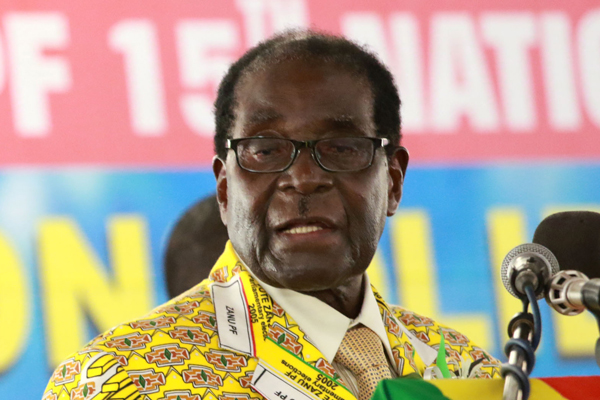
ZANU PF’s internal fights have devastating consequences for Zimbabwe’s economy.
MTHANDAZO NYONI
The latest effects have seen the local bourse losing more than $1 billion in 2015.
Zanu PF is embroiled in vicious internal fights pitting two factions — one reportedly led by Vice-President Emmerson Mnangagwa and the other, a group known as G40, which is linked to First Lady Grace Mugabe.
The wars have seen the quartet of War Veterans minister Christopher Mutsvangwa, his wife Monica, war veterans secretary-general Victor Matemadanda and executive member Headman Moyo, being booted out of the organisation for supporting Mnangagwa recently.
Mutsvangwa was also blasted by President Robert Mugabe on Friday for calling a war veterans meeting. There are fears he may be fired from both party and government.
Meanwhile, the economy is sinking into deep waters — sliding into recession due to acute liquidity crunch, lack of credit lines and power outages, among many other challenges.
- Chamisa under fire over US$120K donation
- Mavhunga puts DeMbare into Chibuku quarterfinals
- Pension funds bet on Cabora Bassa oilfields
- Councils defy govt fire tender directive
Keep Reading
Economic experts say the power struggles in Zanu PF had harmed the economy very badly.
“Serious investors have lost patience with Zimbabwe and our image is that of a state that can no longer command respect or is worthy of the commitment needed to make an investment plan work in this very competitive world,” said economic analyst John Robertson.
He said the implications of the Zanu PF rivalries had put on display the politicians’ selfishness and hunger for power.
“These fights have made Zimbabwe a very expensive place to operate existing businesses, and have made the country an extremely unattractive option for new investors. So we are now witnessing only a few minor inflows of foreign direct investment (FDI),” he said.
Robertson said new and small investment was mainly in retailing and not in the productive sectors, manufacturing, mining or agriculture.
Former Finance minister Simba Makoni said due to infighting, the leaders who were in the party and government were not attending to the issues affecting the country.
“The country as a whole has no direction. It presents a picture of instability to citizens and outsiders and that deters people who want to visit us, for example investors, tourists, traders, etc,” he said. Makoni said the wars also discouraged people from pursuing activities that improved their lives because they have no guidance of leaders that they have to emulate.
He, however, said it’s not about Zanu PF factions or Mugabe, but about the image of the country.
A Bulawayo-based policy analyst Butler Tambo said the poor performance of the economy could be directly linked to the current squabbling in Zanu PF and was mirrored by the poor performance of the Zimbabwe Stock Exchange (ZSE), which in the past year has lost more than $1 billion and has performed worse than it did in 2009.
He said market capitalisation — the total value of the issued shares of a publicly traded company — fell by nearly 30% to $3 billion as at December 31 2015, from the $4 billion recorded during the same period in 2014. This means that $1,3 billion in shareholder value was lost, he said.
Tambo said at the moment, the ZSE monthly turnover had dropped from between $30 million and $50 million to an average $16 million. The October 2015 figures were the lowest since April 2009’s $11,62 million.
He said from 2009 to 2014, monthly turnover had averaged above $30 million. From 2013, the bourse shed off 35% of its value and most stocks were now cheaper than they were at the beginning of 2009 as most investors had pulled out of Zimbabwe, steering clear of the political uncertainty that existed and has been affecting the country post July 2013.
Tambo said because of the current infighting, people now preferred investing outside Zimbabwe, as seen in the January 2016 Monetary Policy statement.
According to the statement, the bank statistics showed that during the period January to December 2015, out of the $1,8 billion externalised in 2015, $1,2 billion was siphoned out by corporates and a total of $684 million was remitted outside Zimbabwe or externalised by individuals under the auspices of free funds for various dubious and unwarranted purposes that include remittance of donations to oneself, offshore investments and externalisation of export sales proceeds by corporates through individual accounts, leading to pervasive tax evasion and externalisation.
The rampant export of liquidity is not sustainable, the statement says.
“What is lacking in Zimbabwe now is the certainty about the future politically and economically, which are two pivotal ingredients for FDI inflows,” Tambo said.
“On these two, Zimbabwe has paid a heavy price because of its failure to resolve its political crisis. In 2015 Zimbabwe received FDI estimated at $591 million, and is projected to receive $614 million in 2016.”
Ironically, Sadc economies of South Africa, Zambia, and Botswana registered foreign direct investment annual averages of $6 billion, $2 billion and $1,8 billion, respectively.
Legislator and economic analyst Eddie Cross said the implications of the Zanu PF succession dogfights were huge and unbearable.
“The fundamental problem we have in Zimbabwe is political uncertainty. We don’t know who is in charge. The international community is satisfied if they know who is in charge,” he said.
“We are in the middle of an economic crisis and the government has no solution. The infighting in Zanu PF is making our economic situation more unbearable.”
Analysts say unless the succession issue was resolved in Zanu PF, the much-vaunted multi-billion dollar mega-deals signed by Zimbabwe and China last year in various sectors of the economy would remain pie in the sky.












